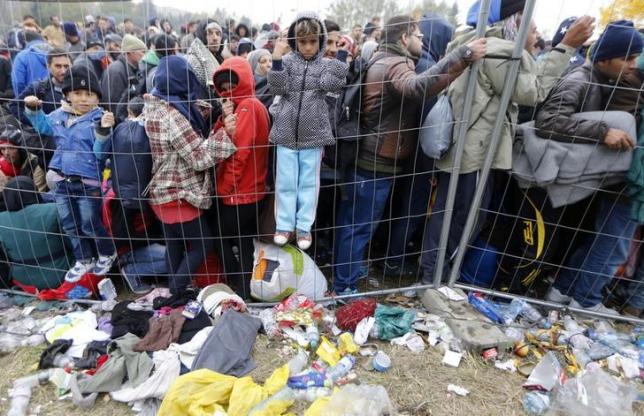Bavarian allies heap pressure on Merkel over refugees
BERLIN: German Chancellor Angela Merkel came under intense pressure for her handling of the refugee crisis on Wednesday, with her Bavarian allies warning of a full-blown coalition crisis unless she takes immediate action to limit a record influx of migrants.
The Christian Social Union (CSU), sister party to Merkel's Christian Democratic Union (CDU), have been outspoken in their criticism of her "open doors" policy towards asylum seekers, in part because their home state of Bavaria is the entry point for virtually all of the migrants arriving in Germany.
Bavarian Premier Horst Seehofer has issued a series of ultimatums to Merkel in recent weeks, including a threat to take the government to court over its refugee policies, only to back down at the last minute.
But the rhetoric reached new heights on Wednesday, with one senior Bavarian official saying relations between the longtime allies had reached their lowest point in nearly four decades and a German newspaper reporting that Seehofer was considering pulling CSU ministers out of Merkel's cabinet in protest.
"We are in the midst of a real coalition crisis," Bavarian Finance Minister Markus Soeder told the Sueddeutsche Zeitung.
"The relationship between the CDU and CSU is more difficult than at any time since 1976," he added, referring to a major fight between former party leaders Helmut Kohl and Franz-Josef Strauss which nearly led to a split.
Although the CSU's bark has proved worse than its bite, the sharper tone underscored how serious tensions within the German government have become as hundreds of thousands of migrants, mainly from Syria and Afghanistan, stream into Germany.
Berlin expects between 800,000 and a million migrants to arrive in Germany this year, twice as many as in any prior year.
Seehofer is due to meet Merkel on Saturday to discuss refugee policy and the two will then hold talks with Sigmar Gabriel, who leads the other party in her "grand coalition", the Social Democrats (SPD).
Merkel has resisted calls to set a ceiling, arguing that the crisis can only be solved by tackling its root causes: the war in Syria and poor conditions for refugees in countries such as Lebanon, Jordan and Turkey.
"OUT OF ORDER"
But in the face of rising criticism and declining poll numbers, some of her leading ministers appear keen to contain further political damage by adopting far tougher rhetoric.
Interior Minister Thomas de Maiziere, acknowledging at a news conference in Berlin that the influx of migrants had accelerated strongly in recent days, vowed to radically increase deportations of those who have no chance of winning asylum.
He described a sharp rise in the number of migrants coming from Afghanistan as "unacceptable" and said talks had been held with the government in Kabul to put a halt to it, saying Afghans should "stay in their country".
However de Maiziere's most pointed rhetoric was reserved for neighbouring Austria, whose recent handling of refugees he called "out of order".
"We observed that refugees, without warning and after dark, were being driven to the German border without any provisions or forethought. There were intensive contacts. Austria agreed yesterday to return to an orderly process. I expect this to occur immediately," de Maiziere said.
Austria on Wednesday outlined plans to build barriers including a fence at a busy crossing on its southern border with Slovenia to slow the influx of transiting migrants.
In a positive sign for Merkel, the SPD signalled that it might be ready to drop its opposition to so-called "transit zones" along the border, which would allow German authorities to register and deport migrants more quickly.
Although Merkel's conservatives have been sinking in the polls, the centre-left SPD has failed to benefit much. Still, the SPD sees the crisis as a political opportunity because it has damaged Merkel, who until recently had seemed destined to cruise to a fourth term in 2017.
In a sign of their newfound confidence, SPD leader Gabriel, who serves as economy minister and vice chancellor in Merkel's government, told Stern magazine on Wednesday that he had set his sights on becoming chancellor himself.
A new poll from Forsa showed Merkel's conservatives dipping two points to 36 percent, their lowest level in three years but still well ahead of the SPD on 24 percent. However 46 percent of those surveyed said they preferred Merkel as chancellor, compared to just 16 percent who supported Gabriel.






